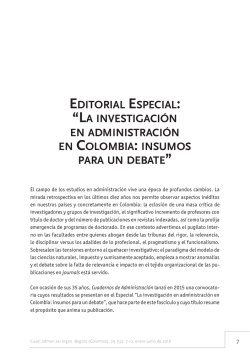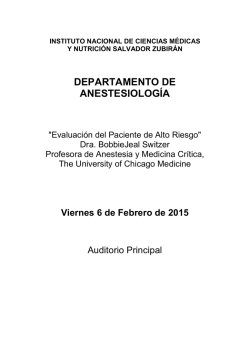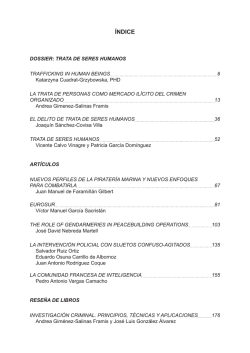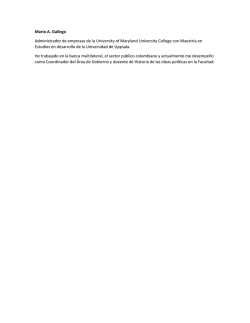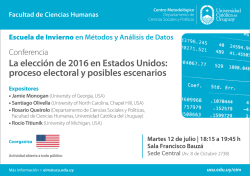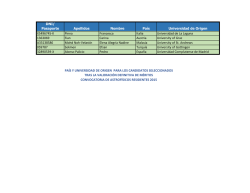
organ trafficking and transplant tourism
The Pontifical Academy of Sciences Summit on ORGAN TRAFFICKING AND TRANSPLANT TOURISM 7-8 February 2017 | Casina Pio IV | Vatican City SUPPORTED BY: THE IRIS O’BRIEN FOUNDATION AND THE GALILEO FOUNDATION Marcelo, I think it would be good to examine human trafficking and modern slavery. Organ trafficking could be examined in connection with human trafficking. Many thanks, Francis 2 Organ Trafficking and Transplant Tourism Introduction T he issue of organ trafficking has been a concern of the World Health Organization (WHO) for three decades, expressed initially in 1987, but reaffirmed by the adoption of a World Health Assembly Resolution (WHA63.22) on 21 May 2010. In that Resolution, the WHO Member States indicated their determination that the growing “utility of human cell, tissue and organ transplantation for a wide range of conditions in low-resource as well as high resource countries” be firmly grounded in the “principles of human dignity and solidarity which condemn the buying of human body parts for transplantation and the exploitation of the poorest and most vulnerable populations and the human trafficking that result from such practices.” Organ trafficking violates the principles of justice, equity and respect for human dignity as it entails not only the sale of organs, but also because it has become a form of slavery that exploits bonded laborers, migrants and refugees fleeing the genocide in their countries, executed prisoners, minors – the destitute and the excluded. Aware of this tragedy, Pope Francis made the eradication of this new form of slavery one of the main goals of his Pontificate. The following information was presented to Pope Francis regarding organ trafficking in September, 2014: Organ trafficking and transplant tourism are driven by the shortage of organs for transplantation-- only 10% (120,000) of the WHO estimated need of 1 million organ transplants are performed each year. Organ trafficking is continuing worldwide in Asia, Mexico and other Latin American Countries, Egypt, Pakistan, India, with recipients coming from Canada and US, Western European countries, Australia, and the Gulf countries such as Saudi Arabia, Kuwait, and The Emirates. Iran is known for its government sponsored sale of human organs. The objectives of the 2017 Pontifical Academy Summit on Organ Trafficking and Transplant Tourism are to describe the widespread extent of transplant tourism and organ trafficking (testimony given by attendees from countries with transplant services currently throughout the world); prepare a Statement referable to the Pontifical Academy Summit that would be signed by the participants and distributed worldwide; engage a group of stakeholders (Government Officials, Prosecutors, Investigators, Justices, and Journalists) who can be influential in the long term in combatting organ trafficking in an alliance with transplant professionals; develop an alliance of individuals committed to combating organ trafficking and transplant tourism – and engaging health authorities to achieve a prohibition of organ trafficking as a form of human slavery – by the representatives participating in the Pontifical Academy Summit. We hope this Summit will create a top-down and bottom-up movement in society, to raise awareness of the extension and seriousness of this modern challenge and lay the groundwork for moral and appropriate solutions based on human dignity, freedom, justice and peace. Probably the only possibility to radically solve this world organ shortage and its tragic consequence of organ trafficking will be when Induced Pluripotent Stem Cells and other scientific advances enable to repair and create the necessary organs. Organ Trafficking and Transplant Tourism 3 Pontificia Academia de Ciencias | Cumbre sobre el tráfico de órganos y el turismo de trasplantes Introducción D esde hace tres décadas, la problemática del tráfico de órganos figura en la agenda de la Organización Mundial de la Salud (OMS); se trató el tema por primera vez en 1987 y, posteriormente, el 21 de mayo de 2010, se reafirmó el compromiso asumido por la OMS en esta materia mediante el dictado de la Resolución WHA63.22 por parte de la Asamblea Mundial de la Salud. En dicha Resolución, los Estados Miembros de la OMS expresaron su firme decisión respecto de que la “utilidad cada vez mayor de los trasplantes de células, tejidos y órganos humanos para una gran variedad de afecciones, en los países de bajos y de altos recursos por igual” se funde estrictamente en “los principios de la dignidad y la solidaridad humanas, que condenan la adquisición de partes del cuerpo humano para el trasplante y la explotación de las poblaciones más pobres y vulnerables y el tráfico humano que se deriva de esas prácticas”. El tráfico de órganos viola los principios de justicia, equidad y respeto de la dignidad humana, en tanto engloba no solo la venta de órganos, sino que también se ha convertido en una forma de la esclavitud que explota a trabajadores en condiciones de servidumbre, poblaciones migrantes, refugiados que huyen de los genocidios que se cometen en sus países de origen, prisioneros ejecutados y menores: en una palabra, a los desposeídos y los excluidos. Consciente de este drama, el Papa Francisco ha puesto como uno de los objetivos de su Pontificado erradicar esta nueva forma de esclavitud. En septiembre de 2014, se presentaron al Papa Francisco los siguientes datos sobre el tráfico de órganos: 4 Organ Trafficking and Transplant Tourism Detrás del tráfico de órganos y el turismo de trasplantes, se encuentra la escasez de órganos disponibles para la realización de trasplantes; anualmente, apenas se lleva a cabo el 10% (120.000) de las intervenciones necesarias; según estimaciones de la OMS, dicha cifra asciende a un millón al año. El tráfico de órganos no se detiene; entre los lugares en los que este flagelo tiene lugar cabe mencionar a Asia, México y otros países latinoamericanos, Egipto, Paquistán e India. Los principales receptores son Canadá y EE.UU. y países de Europa Occidental, Australia, y del Golfo Pérsico, como Arabia Saudita, Kuwait y los Emiratos Árabes Unidos. Y dentro de Irán, se ha llegado a legalizar la venta de órganos humanos. Los objetivos de la Cumbre sobre el tráfico de órganos y el turismo de trasplantes que organizará la Academia Pontificia en 2017 son los siguientes: dimensionar el amplio alcance de esta problemática (con testimonios directos de los asistentes provenientes de países con servicios de trasplantes en todo el mundo); redactar una Declaración que se emita en la Cumbre con la firma de quienes asistan a ella, y luego difundida a nivel mundial; comprometer a actores relevantes y con interés en el tema (funcionarios estatales, fiscales, investigadores, jueces y periodistas) que puedan influir a largo plazo en el combate contra el tráfico de órganos en conjunto con los profesionales del área; desarrollar una alianza de personas para luchar contra estas aberrantes prácticas —y comprometer a las autoridades sanitarias para lograr que se prohíba el tráfico de órganos declarándolo una forma de la esclavitud humana— a través de los representantes que asistan a la Cumbre de la Pontificia Academia. Esperamos que la celebración de esta Cumbre promueva una transformación dinámica en la sociedad, de modo de crear cada vez mayor conciencia respecto del alcance y la gravedad de este drama actual, y que permita sentar las bases para hallar soluciones adecuadas, basadas en la dignidad humana, la libertad, la justicia y la paz. Probablemente, la única posibilidad de resolver de raíz la mencionada escasez de órganos a nivel mundial y su trágica consecuencia, el tráfico de órganos, llegue cuando los avances científicos vinculados a las células madre pluripotentes inducidas y otras innovaciones permitan reparar y crear los órganos necesarios. Programme Day 1 | Tuesday, 7 Febuary 2017 8:30 Welcome Marcelo Sánchez Sorondo Francis Delmonico 8:38 Outline of Summit: Goals and Objectives Jeremy Chapman 8:43 Human Trafficking for the Purpose of Organ Removal (by international legal instruments). Transplant Tourism by the Declaration of Istanbul Alexander Capron 8:53 Trafficking in Human Organs (by the Council of Europe Convention) Marta López Fraga | Comment from Beatriz Domínguez-Gil Region of the Americas 9:00 Canada John Gill | Adeera Levin United States Tim Pruett Mexico Gregorio Obrador Guatemala, Peru Rudolf García Gallont Costa Rica María Matamoros Nicaragua Alexis García López Colombia Alejandro Niño-Murcia Argentina Gabriel Gondolesi Brazil José Medina Pestana | Mário Abbud-Filho 9:45 Panel Discussion 9:50 Invited Remarks Nancy Ascher | Faissal Shaheen | Jay Lavee | Raúl Cervantes Andrade 10:00 General Discussion 11:00 Audience with Pope Francis (requested) African Region 12:00 Egypt Debra Budiani-Saberi Egypt Lin Noueihed Nigeria Ademola Aderibigbe Nigeria Nelufar Hedayat Libya, Sudan, Eritrea, Somalia Campbell Fraser Sub-Sahara Africa, South Africa Elmi Muller 12:30 Panel Discussion 12:35 Invited Remarks Aonghus Kelly | Jonathan Ratel | Sandeep Guleria | Gilad Erlich | Alessandro Nanni Costa 13:00 General Discussion 13:15 Lunch at the Casina Pio IV Organ Trafficking and Transplant Tourism 5 Eastern Mediterranean Region 14:15 Israel Jay Lavee | Gilad Erlich Saudi Arabia Faissal Shaheen Qatar Riadh Fadhil Oman Francis Delmonico Kuwait Mustafa Al-Mousawi Iran Ali Malek Hosseini Iraq and Lebanon Campbell Fraser Syria Bassam Said 14:55 Panel Discussion 15:00 Invited Remarks Mehmet Haberal | Alejandro Niño-Murcia | María Matamoros | Alireza Bagheri | Gabriel Danovitch 14:25 General Discussion European Region 15:30 UK Sally Johnson Ireland James McDaid Sweden Annika Tibell Spain Beatriz Domínguez-Gil Italy Emanuele Cozzi Germany Axel Rahmel Russia Marina Minina Bulgaria Maryana Doitchinova Simeonova Poland Roman Danielewicz Moldova Igor Codreanu Eastern Europe Mirela Bušić Turkey Mehmet Haberal Greece Andreas Karampinis 16:35 Panel Discussion 16:40 Invited Remarks Marti Manyalich | Ignazio Marino 16:55 General Discussion South East Asia Region *Pakistan to be dicsussed here and not in EMRO 17:10 Sri Lanka Jeremy Chapman India Sandeep Guleria India Shashank Bengali Pakistan S. Adibul Hasan Rizvi Pakistan Naziha Syed Ali Nepal, Bangladesh Monir Moniruzzaman 6 Organ Trafficking and Transplant Tourism Cambodia, Malaysia Campbell Fraser Myanmar Curie Ahn Thailand Somchai Eiam-Omg Indonesia Terence Kee 18:00 Panel Discussion 18:05 Invited Remarks Sunil Shroff | Dominique Martin | Nelufar Hedayat | Mansoor Shah 18:25 General Discussion Western Pacific Region 18:40 China Jiefu Huang Korea, Mongolia Curie Ahn Japan Hiroto Egawa Philippines Benita Padilla Cambodia Malaysia Campbell Fraser Vietnam Phan Hai An Singapore Terence Kee 19:15 Panel Discussion 19:20 Invited Remarks Haibo Wang | Philip O’Connell | Maria Soledad Antonio 19:35 General Discussion 20:00 Dinner at the Casina Pio IV 21:30 Bus returns Participants to Hotel Day 2 | Wednesday, 8 February 2017 Combatting Organ Trafficking and Transplant Tourism 8:30 Role of UNODC Ilias Chatzis 8:35 Role of the WHO José Ramón Nuñez Peña 8:40 Role of Prosecutors and Investigators Jonathan Ratel | Raúl Cervantes Andrade | Kristof Van Assche | Aonghus Kelly 9:05 Role of Media Lin Noueihed | Shashank Bengali | Naziha Syed Ali | Nelufar Hedayat 9:25 Role of Governments Maria Soledad Antonio | Kevin Hyland | Milbert Shin The Role of International Professional Organizations 9:45 Canadian Program John Gill 9:50 ExtraTerritorial Jurisdiction Dominique Martin 9:55 Invited Remarks Nancy Ascher | Mehmet Haberal | Adeera Levin | Elmi Muller | Marta López Fraga 10:20 General Discussion Organ Trafficking and Transplant Tourism 7 Deliberations on PAS Statement 11:00 Presentation of PAS Statement Francis Delmonico 11:15 Discussion 11:30 Invited Remarks Jeremy Chapman | Alexander Capron | Benita Padilla | Rudolf García Gallont | Gregorio Obrador | Beatriz Domínguez-Gil 12:00 General Discussion 13:00 Lunch at PAS 14:30 Debriefing with Executive Group List of Participants Dr. Mário ABBUD-FILHO Associate Professor of Medicine Head Nephrology Discipline, Medical School FAMERP, Director Organ Transplantation Center Foundation FUNFARME São José do Rio Preto, SP, Brazil Dr. Ademola ADERIBIGBE Head of Renal Care Center University of Nigeria-Teaching Hospital, medicine Nigeria, Enugu Dr. Curie AHN Department of Translational Medicine Seoul National University, South Korea Dr. Mustafa AL-MOUSAWI Chairman of Organ Transplant Center, Kuwait President of Kuwait Transplant Society Naziha Syed ALI Freelance journalist and documentary film producer Karachi, Pakistan Dr. Maria Soledad ANTONIO Department of Health Philippines Dr. Nancy L. ASCHER Professor of Surgery Division of Transplant Surgery Isis Distinguished Professor in Transplantation Leon Goldman, MD Distinguished Professor in Surgery Dr. Alireza BAGHERI Assistant Professor of Medicine and Medical Ethics, Tehran University of Medical Sciences, Iran. Member of UNESCO International Bioethics Committee Dr. Shashank BENGALI South Asia Bureau Chief at Los Angeles Times Dr. Debra BUDIANI-SABERI Director of NGO Coalition for Organ Failure Solutions Washington DC, USA 8 Organ Trafficking and Transplant Tourism Dr. Mirela BUŠIĆ Head of Department for Special Health Care and Transplantation, Ministry of Health of the Republic of Croatia Dr. Alexander CAPRON USC University Professor Scott H. Bice Chair in Healthcare Law, Policy and Ethics (Gould School of Law) Professor of Medicine and Law (Keck School of Medicine) Co-Director, Pacific Center for Health Policy and Ethics Raúl CERVANTES ANDRADE Dr. Jeremy CHAPMAN Director of the Division of Medicine and Cancer Westmead Hospital, Sydney Mr. Ilias CHATZIS Chief, Human Trafficking and Migrant Smuggling Section Organized Crime and Illicit Trafficking Branch United Nations Office on Drugs & Crime Vienna, Austria Dr. Igor CODREANU Transplant Agency of Moldova Dr. Emanuele COZZI Azienda Ospedaliera di Padova Responsabile S.S.D. Immunologia dei Trapianti Prof. Roman DANIELEWICZ Director, “Poltransplant” Polish Transplant Coordinating Center Warsaw, Poland Dr. Gabriel DANOVITCH Medicine, Nephrology Ronald Reagan UCLA Medical Center Connie Frank Kidney Transplant Center Los Angeles, California, USA Dr. Francis L. DELMONICO New England Organ Bank Professor of Surgery, Harvard Medical School Massachusetts General Hospital Boston, MA, USA Dr. Maryana DOITCHINOVA SIMEONOVA Justice Branko HRAVTIN Dr. Beatriz DOMÍNGUEZ-GIL Dr. Jiefu HUANG Executive director of the Bulgarian Agency of transplantation Sofia, Bulgaria Médico Adjunto en Organización Nacional de Trasplantes Dr. Hiroto EGAWA Tokyo Women’s Medical University Department of Surgery, Institute of Gastroenterology Dr. Somchai EIAM-OMG Professor of Medicine Division of Nephrology Chulalongkorn University Hospital Bangkok, Thailand Mr. Gilad ERLICH Senior Criminal Prosecutor District Attorney of the Central Region (Greater Tel Aviv) Dr. Abdul Sattar FADHIL RIADH Professor of Urology & Transplant Surgery at Hamad Medical Corporation Director of Qatar Organ Donation Center (HIBA) Dr. Campbell FRASER Department of International Business and Asian Studies Griffith Business School Nathan campus, Griffith University, Australia Dr. Rudolf GARCÍA GALLONT Presidente Directiva Hospital Herrera Llerandi President Supreme Court of Croatia Zagreb, Croatia Chairman National Organ Donation and Transplantation Committee Beijing, P.R. China Mr. Kevin HYLAND United Kingdom’s first Independent Anti-Slavery Commissioner, London, UK Ms. Sally JOHNSON Director of Organ Donation and Transplantation NHS Blood and Transplant, UK Prof. Andreas KARAMPINIS President Hellenic Transplant Organization Athens, Greece Dr. Terence KEE Senior Consultant Department of Renal Medicine Singapore General Hospital Mr. Aonghus KELLY European Union Integrated Border Assistance Mission in Libya Dr. Jacob LAVEE Department of Nephrology-Urology and Kidney Transplantation, Manuel de Jesús Rivera Children’s Hospital, Managua, Nicaragua President, Israel Transplantation Society Professor of Surgery Director, Heart Transplantation Unit Leviev Heart Institute, Sheba Medical Center Tel Aviv University Faculty of Medicine Tel Aviv, Israel Dr. Maria Grazia GIAMMARINARO Dr. Adeera LEVIN Dr. Alexis GARCÍA LÓPEZ UN Special Rapporteur on Trafficking in Persons Dr. John GILL President, International Society of Nephrology Vancouver, Canada Professor of Medicine Division of Nephrology St. Paul’s Hospital Vancouver, Canada Dr. Marta LÓPEZ FRAGA Dr. Gabriel GONDOLESI Chief of Organ Transplantation Shiraz University of Medical Sciences Shiraz, Iran Jefe de la Unidad de Soporte Nutricional, Rehabilitación y Trasplante de Intestino Hospital Universitario Fundación Favaloro Buenos Aires, Argentina Dr. Sandeep GULERIA National Kidney and Transplant Institute Delhi, India Dr. Mehmet HABERAL Founder and President of the Turkish Transplantation Society President of the Executive Supreme Board of Baskent University Turkey Dr. Phan HAI AN Director of International Cooperation Department Hanoi Medical University Head of Kidney Diseases and Dialysis Department Viet Duc University Hospital Ms. Nelufar HEDAYAT Scientific Officer European Committee on Organ Transplantation (CD-P-TO) Dr. Sayed Ali MALEK HOSSEINI Dr. Marti MANYALICH President of Donation & Transplantation Institute, DTI Barcelona, Spain Dr. Ignazio MARINO Professor of Surgery Sidney Kimmel Medical College Thomas Jefferson University Philadelphia, USA Dr. Dominique MARTIN Senior Lecturer in Health Ethics and Professionalism at Deakin University Melbourne, Australia Dr. María Amalia MATAMOROS Director, Liver Transplant Centre / Caja Costarricense de Seguro Social (CCSS) Costa Rica Organ Trafficking and Transplant Tourism 9 Dr. James McDAID Belfast City Hospital Queen’s University Belfast, Ireland Dr. José MEDINA PESTANA Professor of Nephrology and Head of the Kidney and Pancreas Transplant Program Hospital do Rim São Paulo, Brazil Dr. Marina MININA Head Coordinating Center of Organ Donation Moscow, Russia Dr. Monir MONIRUZZAMAN Assistant Professor Department of Anthropology and Center for Ethics and Humanities in the Life Sciences Michigan State University Dr. Elmi MULLER Department of Surgery, Groote Schuur Hospital University of Cape Town, South Africa Alessandro NANNI COSTA Dr. Alejandro NIÑO-MURCIA President of Latin American and Caribbean Society of Transplantation Bogotá, Colombia Dr. Axel RAHMEL Medical board German Organ Transplantation Foundation Frankfurt am Main, Germany Mr. Jonathan RATEL Former Head of Special Prosecutions EULEX Kosovo Dr. S. Adibul Hasan RIZVI Professor and Director Sindh Institute of Urology and Transplantation Civil Hospital Karachi, Pakistan Dr. Bassam SAID Consultant Pediatric Nephrologist Al Jahra Hospital, Kuwait President of the Middle East Society for Organ Transplantation (MESOT) H.E. Msgr. Marcelo SÁNCHEZ SORONDO Chancellor of the Pontifical Academy of Sciences Mansoor SHAH Dr. Faissal SHAHEEN Director General Saudi Center for Organ Transplantation (SCOT) Senior Consultant Physician and Nephrologist Mr. Milbert SHIN Lin NOUEIHED Senior Trial Attorney Office of the Prosecutor International Criminal Tribunal for the former Yugoslavia Dr. José Ramón NUÑEZ PEÑA Dr. Sunil SHROFF Medical Director Donation and Transplant program of the World Health Organization WHO Geneva, Switzerland Dr. Gregorio T. OBRADOR VERA Universidad Panamericana, Campus México Dean, Faculty of Health Sciences & School of Medicine Mexico City, Mexico Dr. Philip O’CONNELL Immediate Past President The Transplantation Society Sydney, Australia Dr. Benita PADILLA Internal Medicine and Nephrology, National Kidney and Transplant Institute Manila, Philippines Dr. Timothy PRUETT President American Society of Transplant Surgeons Professor of Surgery and Internal Medicine, John S Najarian Chair of Transplantation University of Minnesota Minneapolis MN USA 10 Organ Trafficking and Transplant Tourism Mohan Foundation Chennai, India Dr. José María SIMÓN Honorary President FIAMC (Fédération Internationale des Associations de Médecins Catholiques) Naziha SYED ALI Assistant Editor at Dawn newspaper, Pakistan Annika TIBELL Prof. Kristof VAN ASSCHE Research Professor in Health Law and Kinship Studies, University of Antwerp, Belgium Dr. Haibo WANG Councilor, Declaration of Istanbul Custodian Group Director, China Organ Transplant Response System Member of National Organ Donation and Transplantation Committee, P. R. China Vers. N. 12 | 5 Jan. 2017 Organ Trafficking and Transplant Tourism 11 Chiesa di Santo Stefano degli Abissini St Stephen of the Abyssinians Church Sede della Pontificia Accademia delle Scienze Seat of the Pontifical Academy of Sciences (Casina Pio IV) Ingresso del Perugino The ‘Perugino’ gate Ingresso Musei Vaticani Entrance gate to the Vatican Museum Domus Sanctae Marthae Altare Tomba S. Pietro Altar of St Peter’s Tomb Ingresso Sant’Uffizio The ‘Sant’Uffizio’ gate Ingresso Sant’Anna The ‘Sant’Anna’ gate MEDIA ENQUIRIES All journalists and media organizations wishing to apply for accreditation may request TEMPORARY accreditation through the online form of the Media Operations Section of the Holy See Press Office website: http:// press.vatican.va/content/salastampa/ en/accrediti/pubblico/ accredito. html Journalists and media organizations regularly accredited at the Holy See Press Office may send their request through the usual channels. All requests must be sent no less than 48 hours before the event. I giornalisti e gli operatori media che intendono partecipare devono inviare richiesta di accreditamento TEMPORANEO attraverso il modulo disponibile online nella sezione accrediti del sito della Sala Stampa della Santa Sede: press.vatican. va/accreditamenti. Coloro che già dispongono di accredito ordinario valido devono inviare una richiesta di partecipazione secondo le consuete modalità. Tutte le richieste dovranno pervenire entro 48 ore dall’evento. Todos los periodistas y gráficos que deseen participar deben enviar una solicitud de acreditación TEMPORAL a través del módulo que está disponible online en la sección de acreditaciones de la página web de la Oficina de Prensa de la Santa Sede: press.vatican.va/ accreditamenti. Los que ya dispongan de acreditación normal válida, deben enviar una solicitud de participación según la modalidad habitual. Todas las peticiones deberán hacerse al menos 48 horas antes del evento. THE PONTIFICAL ACADEMY OF SCIENCES | CASINA PIO IV | V-00120 VATICAN CITY Tel: +39 0669883195 | Fax: +39 0669885218 | Email: [email protected] For further information please visit: www.pas.va | www.endslavery.va /nonservos @nonservos @casinapioiv /nonservos
© Copyright 2026
